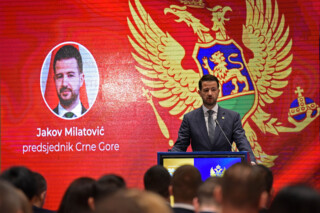“The project Portonovi has a special place in the relations between the two countries. In addition to tourism, Azerbaijani investors are interested in investing in energy and banking sectors”, said Mirzazade.
The tourism resort Portonovi in Kumbor, where construction of the first luxury hotel One&Only in Europe has started recently, is the biggest Azerbaijan’s investment abroad, apart from the energy sector. The project is €650m worth and it is implemented by Azerbaijani company Azmont Investments.
Mirzazade called in mind that an Azerbaijani bank was licensed by the Central Bank of Montenegro (CBCG) and it was expected to start working soon.
“When it comes to the energy sector, I am convinced that the Trans Adriatic Pipeline will contribute to the development of our cooperation in the energy field. When it comes to agriculture, various options are considered, but for now there are no concrete projects”, Mirzazade said.
Asked to assess the economic development of Montenegro during the last ten years, ie since gaining the independence, Mirzazade said that the Montenegrin government had done its best to develop the economy.
As an argument for this assertion, Mirzazade cited the fact that Montenegro is ahead of some countries in the region and even EU member states when it comes to the growth of the gross domestic product (GDP).
“I would like to congratulate the Montenegrin government on its economic and investment policy”, said Mirzazade.
Asked about the pace at which Azerbaijan’s economy progressed since gaining the independence in 1991, he said that the period 1990–1993 would be remembered for the disastrous economic situation. Mirzazade said that at this stage of economic development, the production level significantly fell and that most companies were forced to reduce or even completely stop their operations.
“All this was accompanied by mass layoffs. All efforts to increase salaries and social benefits in order to reduce social tensions, without taking into account the real possibilities of the economy, led to an acceleration of inflation and creating conditions for hyperinflation. In 1994 the inflation rate stood at 1763.5, whereas in the period 1990–1995 GDP recorded a 13–20% decline”, said Mirzazade.
He added that the financial-banking sector was also paralysed, while the national currency began to depreciate. In 1995 its exchange rate against the US dollar was reduced 245 times.
“After 1993, primarily due to far-reaching policy and hard work of then president Heydar Aliyev, the country was able to recover in a relatively short period and to achieve great success in the field of socio-economic development of the country. As a result of those changes, in 1996 macroeconomic stability was reached in a country that used to be in the economic crisis and since 1997 a dynamic economic development has begun”, said Mirzazade.




